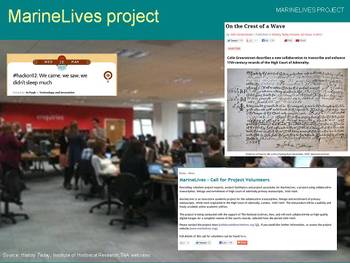MarineLives
Welcome to the MarineLives project
The MarineLives collaborative public history project was established in 2012 to digitise, transcribe and annotate the manuscript records of the English High Court of Admiralty from the 1650s and 1660s. The original records are held at the National Archives in Kew.
The project is led and advised by academics and members of the general public.
In the last three years project volunteers have transcribed over 3 million words and 6000 pages of Admiralty Court records.
Our team based transcription programmes
We run regular team-based transcription programmes on-line, facilitated by trained team leaders, with teams of three or four volunteer associates. These programmes last twelve weeks, and will take a transcriber from a novice to a confident transcriber in that space of time.
Thomas Davies is a third year history undergraduate student curretnly studying at Bath Spa University. In the summer of 2014, Thomas was a member of a four person virtual team of volunteers transcribing Admiralty Court witness statements from 1658 to 1660, facilitated by Dr. Philip Hnatkovich in Pisstsburgh
"...There were some challenging aspects of the programme — the main being distance. This was because we worked as a team and half of the team were based in the United Kingdom and half were based in the United States, so we had to be aware of time differences and that we would be unable to meet in person. To combat this we used email, Google Hangouts, and Skype and made good use of all the resources available to stay in touch when working on the documents together. We had weekly calls to discuss team business. The weekly calls helped because we would talk about the problems or issues we faced weekly and how the transcriptions were to be presented covering topics such as layout or abbreviations...." (Thomas Davies, Bath Spa University)
To learn more about our programmes read what our volunteers have to say - Katie Parker (a PhD candidate at the University of Pittsburg), Thomas Davies (a third year undergraduate at Bath Spa University), and Roger Towner (a regulator of seafarers' qualifications, who has spent twenty five years at sea as a navigator and Master)
Please contact us to discuss volunteering, or to explore how we might work with your University, School or Local History Society.
The Court records
Click here for full listing of Admiralty Court records within scope of MarineLives project
The English High Court of Admiralty produced a wide range of documents.
The various steps in a particular case can be followed in summary form in the Acts of Court.
A case was commenced with the issuing of a Warrant by the Court, and the preparation of a Libell or an Allegation by the party commencing the case.
Prior to witnesses being called to make their depositions, the defendant or "respondent" might make a Personal Answer in response to the Libell or Allegation.
The most accessible of the court records are the statements made by witnesses, which are called Depositions. These depositions were in response to written Interrogatories, which were prepared by both plaintiffs and defendants in a case.
Various written documents were submitted by plaintiffs and defendants, as well as witnesses, during a court case. Some of these have survived as loose documents in the Instance Papers.
Many cases were settled prior to the giving of a formal verdict or Sentence. For those cases which went to sentence, the sentences can be found in document bundles. These bundles often include bills of expense related to the case, and in some cases include copies of the allegations or libells, and other miscellaneous documents.



